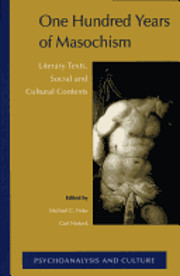

Pulse en una miniatura para ir a Google Books.
|
Cargando... One hundred years of masochism : literary texts, social and cultural contextspor Michael C. Finke
Ninguno Actualmente no hay Conversaciones sobre este libro. Ninguna reseña sin reseñas | añadir una reseña
Just over a century has passed since the sexologist Richard von Krafft-Ebing coined the term masochism in a revised edition of his Psychopathia Sexualis (1890). Put into circulation as part of the fin-de-siecle process through which sexuality and sexual practices considered deviant became medicalized, this suspicious concept grew in significance and explanatory power in the expanding new context of psychoanalytic discourse. Today the study of masochism shows signs of becoming a discipline in its own right, the political, social, and cultural ramifications of which exceed and, indeed, render problematic, traditional psychoanalytic perspectives on the phenomenon. The essays in this volume demonstrate, however, that the concept of masochism still offers a point of entry into psychoanalytic theory that, while revealing a number of its most vexing insufficiencies and problematic constructions, evokes also a sometimes surprising illuminative potential and capacity to adapt to changing social realities.And as the volume's title is meant to suggest, the authors represented here tend to agree that the continued rich viability of psychoanalytic theory in cultural analysis is best appreciated and ensured through engaging the theory's own social-historical and cultural contexts. The volume includes clinical perspectives on masochism, and articles on medieval romance, Goethe, Sacher-Masoch, Krafft-Ebing's Psychopathia Sexualis, Turgenev, Tolstoy, Multatuli, Fassbinder, and masochism and postmodernism. No se han encontrado descripciones de biblioteca. |
Debates activosNinguno
 Google Books — Cargando... Google Books — Cargando...GénerosSistema Decimal Melvil (DDC)306.776Social sciences Social Sciences; Sociology and anthropology Culture and Institutions Relations between the sexes, sexualities, love Practices MasochismClasificación de la Biblioteca del CongresoValoraciónPromedio: No hay valoraciones.¿Eres tú?Conviértete en un Autor de LibraryThing. |
||||||||||||||||||||||||||||||||||||||||||||||||||||||||||||||||||||||||||||||||||||||||||||||||||||